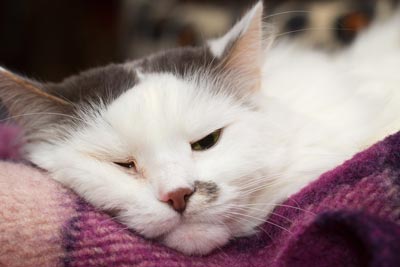Most Common Illnesses in Cats

Knowing the most common conditions and illnesses that affect cats and their signs can help you recognize a problem more quickly. Getting your cat to the vet routinely for check-ups is another way that common feline illnesses can be caught and treated early.
The veterinarians at CatHealth.com have created this list of the most common cat conditions based on their experience. Any change in your cat's behavior or health status warrants a visit to the vet.
Kidney Disease
Kidney disease is common in older cats, and most often, the signs that are initially noticed include increased water consumption, increased urination, and weight loss. Other signs may include increased vomiting, foul breath, and decreased appetite.
It is important to have blood screens done on your older cat at regular intervals to check kidney function values because, by the time most cats show recognizable signs of illness, 75% of their kidney function is already irretrievably gone. You can learn more here: "Kidney Disease in Cats."
Upper Respiratory Infection
Upper respiratory infections (URI) are fairly common in cats, especially kittens. Calicivirus and herpesvirus account for the majority of URI cases in cats. Affected cats may sneeze, cough, wheeze, have discharge from the eyes and nose, and sometimes have a decreased appetite.
If your kitten or cat is showing any of the signs listed above, it's important to have them checked out by a veterinarian because there are times when a secondary bacterial infection needs to be treated. Dehydration may also need to be addressed, and other causes of coughs need to be ruled out. You can learn more here: "Upper Respiratory Tract Conditions in Cats."
Hyperthyroidism
Hyperthyroidism is diagnosed quite frequently in older cats. The exact cause of this illness, which was first described in the 1970s and has increased in incidence since then, is still being heavily researched. Hyperthyroidism in cats results in an increased metabolism, and the signs commonly associated with it include increased appetite, weight loss, increased heart rate, irritability or hyperactivity, and sometimes increased vomiting.
There are three main ways to treat hyperthyroidism: medication, surgery, and radioactive iodine therapy. Which treatment is chosen depends on individual circumstances and concurrent illnesses. You can learn more here: "Hyperthyroidism in Cats."
Diabetes Mellitus
Diabetes mellitus is a serious condition in cats, and it is diagnosed fairly commonly. Its signs include increased water consumption, increased urination, weight loss, and increased appetite. Feline diabetes is serious, and it becomes life-threatening if it is not recognized and treated. Keeping your cat at a healthy weight is one way to decrease his risk of developing diabetes mellitus. You can learn more here: "Feline Diabetes Mellitus."
Lower Urinary Tract Disease
Lower urinary tract disease, or abnormal conditions of the bladder and urethra, is extremely common in cats. These issues can result in inappropriate urination and life-threatening urinary tract blockage, especially in male cats.
If your cat begins urinating outside of the litter box, appears to be straining to urinate, is making frequent trips to the litter box but only producing small amounts of urine, is crying while attempting to urinate, or has visible blood in the urine, you need to get him to the veterinarian right away. In fact, crying while attempting to urinate, trips in and out of the litter box, and straining to urinate are all signs of urinary blockage in male cats, which is an emergency situation. You can learn more here: "Feline Lower Urinary Tract Disease."
Gastrointestinal Problems
Gastrointestinal problems are commonly diagnosed and cats, and may include any of the following:
Countless conditions can cause gastrointestinal problems in cats, including intestinal parasites, irritable bowel syndrome, megacolon, food allergy or sensitivity, and the list goes on. Any change in your cat's litter box habits, appetite, or frequency of vomiting warrants a visit to the veterinarian.
You May Also Like These Articles:
Urinary System Blockage in Cats
Upper Respiratory Tract Conditions in Cats





